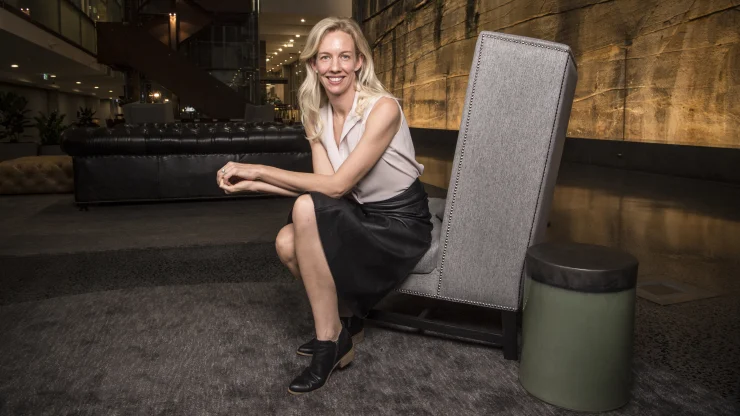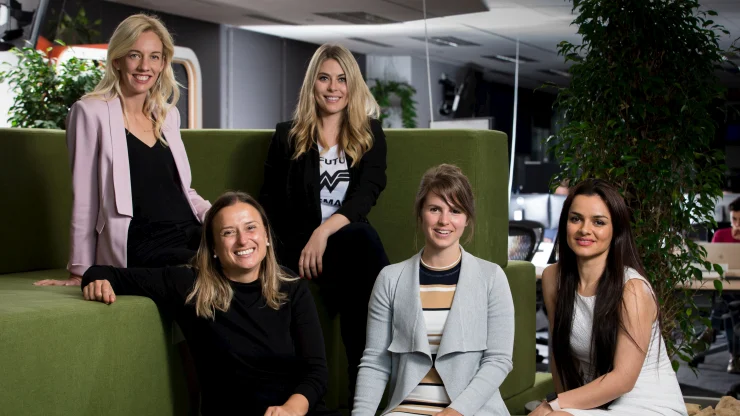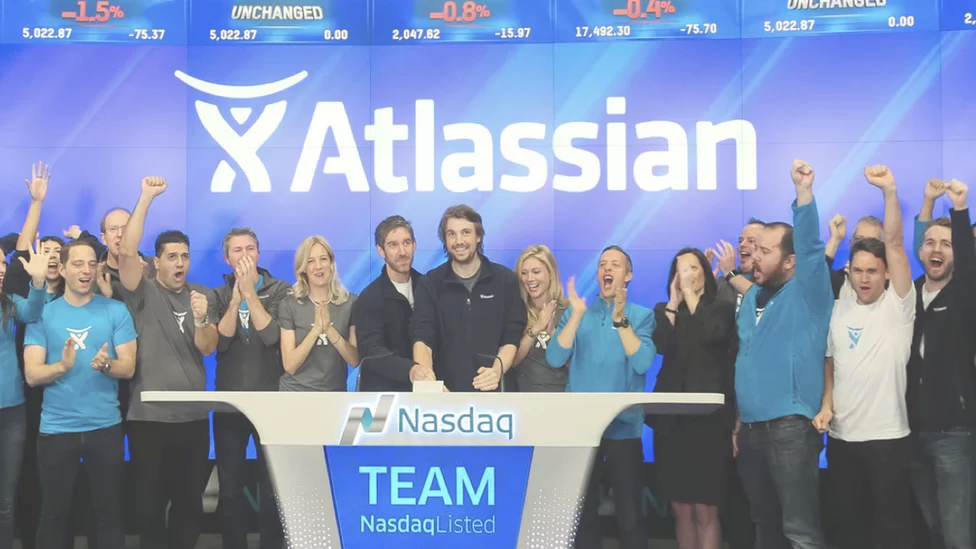Further Reading On Scott Farquhar: BBC: How a missing letter helped create a tech billionaire [4 March 2019]
And on Kim Jackson (Scott's wife): SMH: How Kim Jackson is carving her own path beyond 'Atlassian co-founder's wife' [1 July 2018]
Excerpt from that second article:
In the six short months since starting investment company Skip Capital, Kim Jackson has quickly become one of the most influential investors in the country.
The trained engineer and former investment banker has made significant investments in seven start-ups with a focus on female-led and founded businesses.

Kim Jackson has a focus on female-led start-ups at Skip Capital. Photo Credit: WOLTER PEETERS
It's somewhat incongruous then that her own public relations firm plugs Ms Jackson as the "Atlassian co-founder’s wife".
Sitting in the firm's offices, opposite Sydney's Barangaroo, Ms Jackson has a slightly different take on things.
"I run Skip full time and Scott Farquhar, co-founder of Atlassian, is the co-founder of Skip" is how she prefers to put it. "That’s my day job - it's more than a day job. I’m loving it. Scott obviously has a day job. He gets involved where he can."
In the past, Ms Jackson has remained in the background, working on her own career and raising the couple's three children, but launching Skip has meant taking on a more public role.
Choosing her words carefully and flushing as she leans in to answer questions, Ms Jackson is a little uncomfortable being the focus of attention.
But she's relishing her role heading multimillion-dollar fund Skip and is particularly delighted that of the seven start-ups Skip has invested in, four are led by women.
"I wasn't going out looking for female founders," Ms Jackson says. "I was looking for phenomenal entrepreneurs who had really deep experience and were solving a real problem with a global outlook and I just found this really incredible pool of female talent."
Ms Jackson says her "unique history" helped her identify these businesses.
From aluminium smelter to Atlassian
Growing up in the Queensland town of Yeppoon, north of Rockhampton, Ms Jackson graduated dux of her school.
"I went to a co-ed school and I studied maths and science because I loved maths and science and right from the beginning there were always more boys in my class than girls and I felt equal, I hardly even noticed it to be honest," she says.
Ms Jackson studied systems engineering at ANU, a course she says was "90 per cent-plus" male, and was president of the engineering society.
"I did a lot of male-dominated things through that period," Ms Jackson says. "I worked every Christmas holidays at the aluminium smelter near Yeppoon. I was on a scholarship with Comalco Engineering and I worked ... on the floor of the smelter wearing my King Gee pants and top, 1000-volt boots and hard hat and respirator. During that period, I got my crane licence and forklift licence and I was the only girl in my crew. I felt very happy there."
I was always either the only or one of two females in a room. I just really want to change that.
Kim Jackson
After graduating, Ms Jackson moved into investment banking - "again 90 per cent-plus male dominated" - at Salomon Smith Barney, which became Citigroup, and Hastings Fund Management, before moving on to board positions, including at Transgrid and Electronet.
Along the way, Ms Jackson met Mr Farquhar "through mutual friends" and married him.
"That's a long way of saying I was always either the only or one of two females in a room," she says. "I just really want to change that."
Ms Jackson is in a unique position to effect that change with software giant Atlassian, the business Mr Farquhar co-founded with Mike Cannon-Brookes, listed on the Nasdaq Composite Index and Mr Farquhar's wealth estimated at $5.1 billion by the Australian Financial Review Rich List.

Kim Jackson (left) of Skip Capital with the founders of the female-led start-ups she has invested in: Katherine McConnell, Gemma Lloyd, Megan Elizabeth and Maryam Sadeghi.
Some of that wealth will be invested through Skip, including its four investments in female-led businesses: energy finance start-up Brighte, founded by Katherine McConnell; gender equity recruitment start-up WORK180, founded by Gemma Lloyd and Valeria Ignatieva; skin cancer detection start-up MetaOptima, co-founded by Maryam Sadeghi; and "early stage" craft app Making Things, founded by Megan Elizabeth.
Skip was one of the key investors in Brighte's recent series-B funding round, which raised $18.5 million. For Ms McConnell, having Skip and Ms Jackson on the board has given the energy finance start-up a significant boost.
"Kim was able to understand the complexity of the business," she says.
Ms McConnell says fundraising was tough, particularly the initial seed round where she raised $3.5 million pre-product.
"I was a sole female founder without a tech background setting up a lending business," she says. "It had never been done before. I am a mum with two young kids and I worked part-time at [investment bank] Macquarie. I think people definitely underestimated my ability to execute and that the depth of experience I had could be a competitive threat."
Ms Jackson isn't surprised and cites a Boston Consulting Group survey that found only 2 per cent of venture capital (VC) funding goes to female-led companies.
"It's a real shame that is happening," she says. "It pains me that 90 per cent of VCs are male. I think that needs to change. Female founders are just as good. I think that the investment community and maybe the world is only just starting to work that out."
Ms Jackson won't divulge the amount of money Skip has to invest but says she is looking to make "significant investments" in the tech space.
"The companies we can add most value to are Australian high-tech companies which can benefit from my background in engineering and Scott's background in computer science and our knowledge and networks and connections," she says.

Husband and wife Scott Farquhar and Kim Jackson.
Ms Jackson says so far, working with her husband is going well.
"It's not like we are working together day to day," she says. "He gets involved in mentoring and he gets involved in particular sectors that are of interest to him.
"We will choose different companies for each of us to lead the investment. We are a really great team and we have separated the roles extremely well."
--- end of excerpt ---
Source: https://www.smh.com.au/business/small-business/how-kim-jackson-is-carving-her-own-path-beyond-atlassian-co-founder-s-wife-20180628-p4zoeg.html
Also: AFR: Chanticleer: Why Atlassian’s Farquhar wants to take Genex private [25 July 2022]
Excerpt:
First, Mike and Annie Cannon-Brookes’ investment vehicle, Grok Ventures, tried to take giant AGL Energy private.
Now, the other billionaire couple behind software company Atlassian, Scott Farquhar and wife Kim Jackson, have launched their own raid on an ASX energy company, launching a bid for renewable infrastructure group Genex Power.

Skip Capital’s Scott Farquhar and Kim Jackson are another example of how an influential group of billionaire families are pioneering a new style of activist investing. [David Rowe]
Sure, the scale is just a little different; Grok’s bid (in partnership with Canadian giant Brookfield) was worth $8 billion, while Jackson and Farquhar’s bid (which involves their Skip Capital vehicle teaming up with a US-based private equity firm called Stonepeak) is worth a touch over $500 million ($318 million equity plus debt).
But the basic idea is the same. Just like the Cannon-Brookes, Jackson and Farquhar are prepared to put big licks of capital to work to accelerate the energy transition. And just like Grok originally argued with AGL, Skip believes Genex will be better placed to navigate that transition as a private company backed by long-term, patient capital.
Genex, which listed in mid-2015, is a fascinating little company that operates the Kidston Clean Energy Hub. It has operated a 50 megawatt solar project since 2017 and is developing a 250MW pumped hydro storage project, which is to be located in a former gold mine. It owns a second solar project in NSW, and a battery project in central Queensland that is due to commence operation in the middle of next calendar year.
But as with many listed renewable infrastructure firms, life as a listed company has been challenging for Genex. The constant need for capital to develop its ambitious projects – it has raised almost $190 million through four separate capital raisings in the past three years – has weighed on its share price. The stock has traded in a range broadly around its 20¢ issue price for much of its listed life, and between 10¢ and 24¢ over the last 12 months.
Jackson, who spent 13 years as an investment director at infrastructure specialist Hastings Funds Management before founding Skip in 2017, has been a key supporter of Genex. Skip holds a 10 per cent stake in Genex alongside its portfolio of mostly private renewable investments that encompasses 100MW of renewables assets and more than 4300km of transmission and distribution assets.
Think bigger
But now Jackson, who worked on a range of big-ticket infrastructure bids at Hastings, including the acquisition of Transgrid and the Sydney Desalination Plant, believes it is time for Genex to think bigger. The Skip camp believes Genex can potentially double its renewable energy capacity with the support of private capital that will free it from the need to regularly tap shareholders for dilutive capital raisings.
Stonepeak, which is run by former Macquarie banker Michael Dorrell and has another “Millionaire’s Factory” alumni Darren Keogh leading its Australian business, is teaming up with Skip in what is the US group’s first Australian play.
Late last week, Skip and Stonepeak bought stakes held by First Sentier Investors and Paradice Investment Management, giving their consortium a 19.99 per cent stake in Genex. On Friday night, Skip and Stonepeak lobbed their bid to Genex’s board, priced at 23¢ a share – a whopping 70 per cent premium to Genex’s last close, and a 95 per cent premium to its volume weighted average price over the previous month.
Although the consortium arrangement between Skip and Stonepeak meant the bid became public sooner than any of the parties would have liked, the Skip camp emphasises this is as friendly a bid as it can be.
Still, the 19.99 per cent stake amassed by the consortium – which is being advised by Jarden and RBC – should show the consortium means business, and provide a deterrent for other potential bidders who may approach Genex and its banker, Goldman Sachs.
The Genex board is still considering its position, and there’s a way to go before any deal is reached. Nevertheless, this transaction is unlikely to attract anything akin to the column inches the Cannon-Brookes’ tilt at AGL received.
But it is another example of how an influential group of billionaire families – the Cannon-Brookes, Farquhar and Jackson, and Andrew Forrest and his wife Nicola Forrest – are pioneering a new style of activist investing.
These billionaire families are targeting ASX-listed companies where the entrepreneurs believe the fortunes they have built through public markets can offer the sort of private, patient capital these firms need to juice their profits and their sustainability goals.
--- end of excerpt ---
Source: https://www.afr.com/chanticleer/why-atlassian-s-farquhar-wants-to-take-genex-private-20220725-p5b4aa
Further, Further Reading:








 AFR:
AFR:  AFR:
AFR:  SMH:
SMH: 
